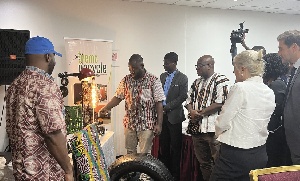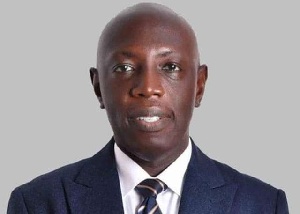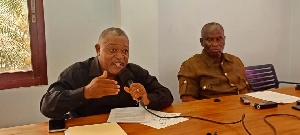- Home - News
- Elections 2024
- News Archive
- Crime & Punishment
- Politics
- Regional
- Editorial
- Health
- Ghanaians Abroad
- Tabloid
- Africa
- Religion
- Photo Archives
- Press Release
General News of Friday, 6 June 2025
Source: www.ghanawebbers.com
Ghana advances sustainable e-waste practices
Ghana has successfully completed the Sustainable Recycling Industries (SRI) project. This initiative has laid a strong foundation for e-waste management. It has also achieved important advancements in technical, policy, and institutional areas.
At a ceremony marking the project's end, Dr. Ibrahim Murtala Muhammed spoke about its significance. He is the Minister of Environment, Science and Technology. He called the project a turning point in addressing e-waste issues.
“When the project started in 2013, we faced serious e-waste challenges,” he said. “Today, with support from the Swiss Government, we have established an effective framework for managing e-waste.”
The SRI Project was funded by Switzerland's State Secretariat for Economic Affairs (SECO). It began when Agbogbloshie was known as West Africa’s largest informal e-waste site.
Dr. Muhammed noted that digitalization brings benefits but also increases hazardous waste. Discarded electronics contain toxic substances like lead and mercury. These pose health risks, especially to children, and harm the environment if not managed properly.
In response to this crisis, Ghana ratified the Basel Convention. The country also enacted the Hazardous and Electronic Waste Control Act in 2016. The SRI Project helped implement these laws effectively.
Phase II of the project developed guidelines for managing used lead-acid batteries. It supported micro and small enterprises and introduced innovations in hazardous waste treatment. The project also integrated sustainable e-waste recycling into vocational training programs.
Madam Simone Giger is Switzerland's Ambassador to Ghana, Togo, and Benin. She stated that the SRI Project set a foundation for both e-waste reform and circular economy practices in Ghana.
“The achievements we celebrate today show what collaboration can achieve,” she said. She emphasized that e-waste is one of the fastest-growing global waste streams.
Madam Giger called for ongoing innovation and stronger policy enforcement in this area. She believes Ghana can become a regional leader in sustainable electronics management.
In her speech read by another official, Prof. Nana Ama Klutse highlighted that e-waste is both an environmental issue and a public health concern. Toxic accumulation at sites like Agbogbloshie poses risks to untrained youth recyclers.
Prof. Klutse pointed out that including e-waste recycling in vocational training will benefit future workers. This will promote sustainable materials recovery and green jobs.
Stakeholders agreed that the SRI Project marks significant progress toward sustainability in Ghana. It contributes to job creation and protects public health as well.











